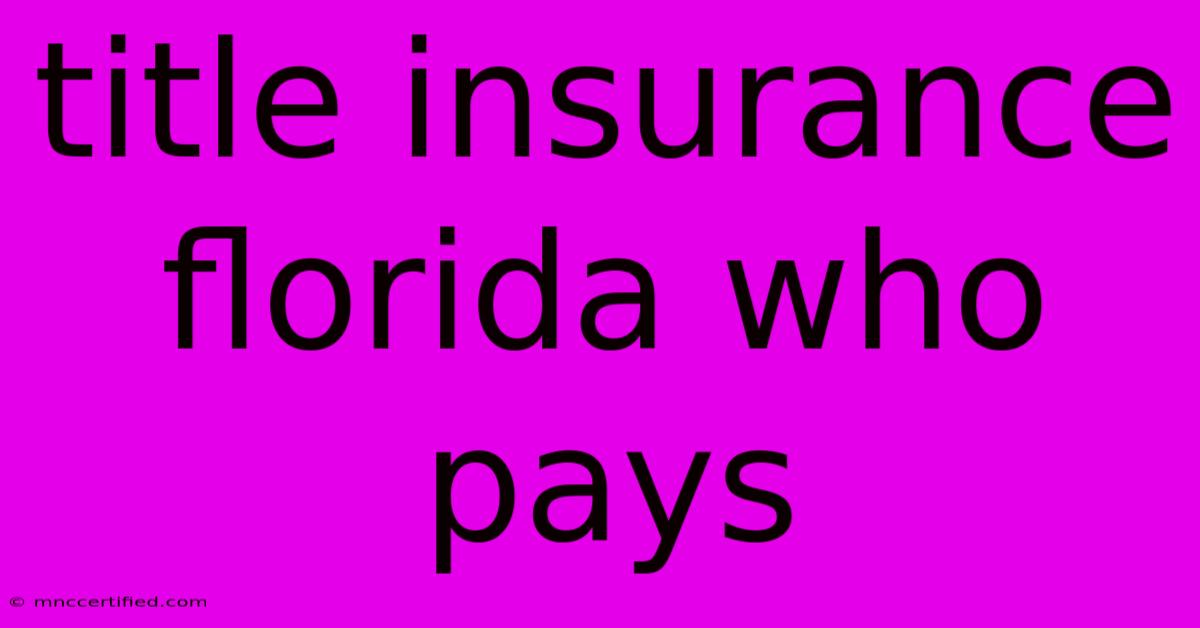Title Insurance Florida Who Pays

Table of Contents
Florida Title Insurance: Who Pays the Premiums? A Comprehensive Guide
Buying a home in Florida is a significant investment, and understanding the intricacies of the closing process is crucial. One key element often causing confusion is title insurance – specifically, who pays for Florida title insurance. This comprehensive guide will clarify the process and answer your questions.
Understanding Florida Title Insurance
Before diving into who pays, let's briefly define what title insurance is. Title insurance protects buyers and lenders against financial losses stemming from defects in the ownership chain of a property. These defects can include:
- Forged deeds: Documents fraudulently transferring ownership.
- Unpaid taxes or liens: Outstanding debts attached to the property.
- Errors in public records: Mistakes in official documents impacting ownership.
- Encroachments: Structures built on neighboring land.
- Boundary disputes: Uncertainty about the exact property lines.
Essentially, it's an insurance policy safeguarding your investment against unforeseen title issues.
Who Pays for Title Insurance in Florida? The Usual Scenario
In most Florida real estate transactions, both the buyer and the lender will purchase separate title insurance policies.
Lender's Title Insurance:
- Who pays: The buyer typically pays for the lender's title insurance policy. While technically protecting the lender's financial interest in the property (their mortgage loan), it's a cost usually borne by the buyer as part of the closing costs.
- Purpose: Protects the lender against title defects that could affect their ability to recover the loan amount if the borrower defaults.
- One-time payment: This is a one-time premium paid at closing.
Owner's Title Insurance:
- Who pays: The buyer usually pays for the owner's title insurance policy.
- Purpose: Protects the buyer's ownership rights and interest in the property against title defects. Unlike lender's title insurance, this policy protects the buyer long-term – often for as long as they or their heirs own the property.
- One-time payment: This is also a one-time premium paid at closing.
Exceptions and Variations: When Things Might Differ
While the above scenario is standard, certain situations can lead to variations:
- Negotiations: In some cases, the buyer and seller might negotiate who pays for certain closing costs, including title insurance. A strong buyer's market could see the seller offering to cover part or all of the title insurance premiums as an incentive.
- Seller concessions: As part of a wider negotiation, the seller might agree to pay for the buyer's title insurance as a concession to secure the sale. This is more common in a seller's market.
- Refinancing: When refinancing a mortgage, the lender will typically require a new lender's title insurance policy, paid for by the homeowner. Owner's title insurance is usually already in place.
Choosing a Title Insurance Company in Florida
Selecting a reputable title insurance company is vital. Consider factors like:
- Reputation and experience: Look for companies with a long history of successful title searches and claims handling in Florida.
- Customer reviews and ratings: Check online reviews to gauge customer satisfaction.
- Cost and coverage: Compare quotes from different companies while ensuring adequate coverage.
- Accessibility and responsiveness: Choose a company with excellent customer service and easy communication channels.
Key Takeaways: Florida Title Insurance Costs
Remember, while the buyer typically covers both the lender's and owner's title insurance premiums, it's crucial to:
- Review your closing disclosure carefully: Understand all closing costs, including the breakdown of title insurance premiums.
- Negotiate with your real estate agent: Discuss who will bear these costs as part of your overall negotiation strategy.
- Ask questions: Don't hesitate to clarify any doubts about title insurance with your real estate agent, lender, or title company.
Understanding who pays for title insurance in Florida is vital for a smooth and informed home-buying experience. By understanding these dynamics, you can navigate the closing process confidently and protect your investment.

Thank you for visiting our website wich cover about Title Insurance Florida Who Pays. We hope the information provided has been useful to you. Feel free to contact us if you have any questions or need further assistance. See you next time and dont miss to bookmark.
Featured Posts
-
Russia Retaliates Ukraine Deploys Long Range Missiles
Nov 22, 2024
-
Colorado Lands 5 Star Qb Lewis
Nov 22, 2024
-
Mfs Investment Management Salary
Nov 22, 2024
-
Intel Briefings Shift To Mar A Lago
Nov 22, 2024
-
Homeowners Insurance New Bern Nc
Nov 22, 2024